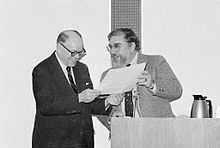Forrest C. Pogue
Forrest Carlisle Pogue Junior (born September 17, 1912 in Eddyville , Kentucky , † October 6, 1996 in Murray , Kentucky) was an American historian (diplomatic and military history). For many years he was director of the George C. Marshall Foundation and director of the Marshall Library on the grounds of the Virginia Military Institute in Lexington . He was the official biographer of George C. Marshall .
Life
Pogue studied at Murray State University with a bachelor's degree in 1931 and the University of Kentucky with a master's degree in 1932. He was an instructor at Western Kentucky University in 1933 and from 1933 to 1942 at Murray State University, was American from 1937/38 Exchange Fellow in International Relations at the Sorbonne and received his PhD from Clark University in 1939 . During the Second World War he was a historian in the US Army and collected oral history interviews from soldiers under Samuel Marshall on the front lines in Europe . He followed the troops from the landing in Normandy ( Omaha Beach ) to the conquest of Germany as far as Pilsen . For this he received the Bronze Star and the Croix de guerre . He remained with the Army as a historian until 1952 and was operations research analyst for Johns Hopkins University from 1952 to 1954 at the US Army European headquarters in Heidelberg . From 1954 to 1956 he taught again at Murray State University. From 1956 to 1964 he was director of the George C. Marshall Research Center and from 1964 to 1974 first director of the George C. Marshall Research Library .
Most recently, he was director of the Dwight D. Eisenhower Institute for Historical Research , Museum of History and Technology, Smithsonian Institution . In 1984 he retired. In 1972 he was visiting professor at the Virginia Military Institute and he taught at George Washington University . Pogue was a Fellow of the American Military Institute and an Honorary Fellow of the US Army Military Research Institute. He was chairman of the American Committee on the History of the Second World War . He was also president of the American Military History Institute and the Oral History Association .
He has received multiple honorary doctorates (Murray State University, Washington and Lee University , Clark University 1975 and University of Kentucky 1983). In 1987 he received the Samuel Eliot Morison Prize and in 1988 the Francis Parkman Prize for Special Achievement.
Fonts
- The Supreme Command: United States Army in World War II, The European Theater of Operations , Washington DC, Office of the Chief of Military History, 1954
- George C. Marshall , 4 volumes, Viking Press, from 1963 ( Education of a General, 1880-1939 , 1963, George C. Marshall: Ordeal and Hope, 1939-42 , 1966, George C. Marshall: Organizer of Victory, 1943 -45 , 1973, George C. Marshall: statesman, 1945-1959 , 1987, Penguin 1989)
- with others: The Meaning of Yalta: Big Three Diplomacy and the New Balance of Power , Louisiana State University Press 1956
- Associate Editor D-Day: The Normandy Invasion in Retrospect , Milton S. Eisenhower Foundation, University Press of Kansas 1971
- The revolutionary transformation of the art of war , in Irving Kristol (Editor) Americas Continuing Revolution , American Enterprise Institute for Public Policy Research, Washington DC 1975
- Patton in Michael Carver The War Lords: military commanders of the twentieth century , Boston: Little, Brown 1976
- The Genesis of The Supreme Command: Personal Impressions of Eisenhower the General , in Günter Bischof, Stephen E. Ambrose (Editor) Eisenhower: A Centenary Assessment , Louisiana State University Press, 1995
- Associate Editor and Contributor to: Guide to American Foreign Relations , 1983
- Pogue's was: diaries of a WWII combat historian , University of Kentucky Press 2001
- George C. Marshall: interviews and reminiscences for Forrest C. Pogue , Lexington, Virginia, George C. Marshall Research Foundation 1991
Web links
| personal data | |
|---|---|
| SURNAME | Pogue, Forrest C. |
| ALTERNATIVE NAMES | Pogue, Forrest Carlisle junior (full name) |
| BRIEF DESCRIPTION | American historian |
| DATE OF BIRTH | September 17, 1912 |
| PLACE OF BIRTH | Eddyville , Kentucky |
| DATE OF DEATH | October 6, 1996 |
| Place of death | Murray , Kentucky |

